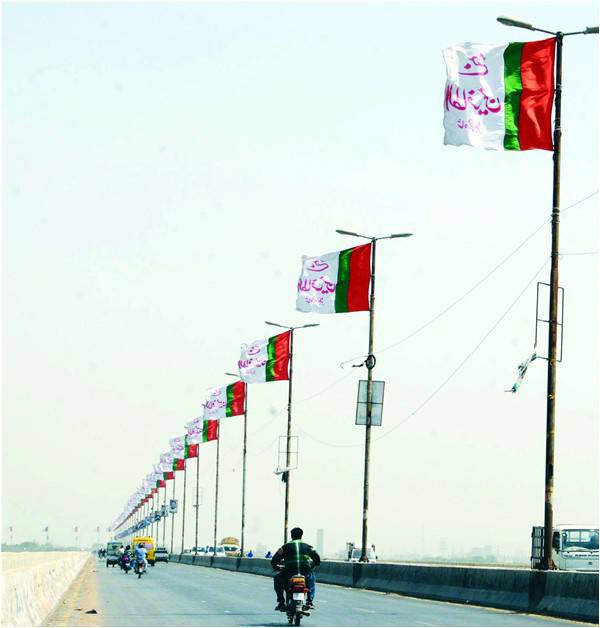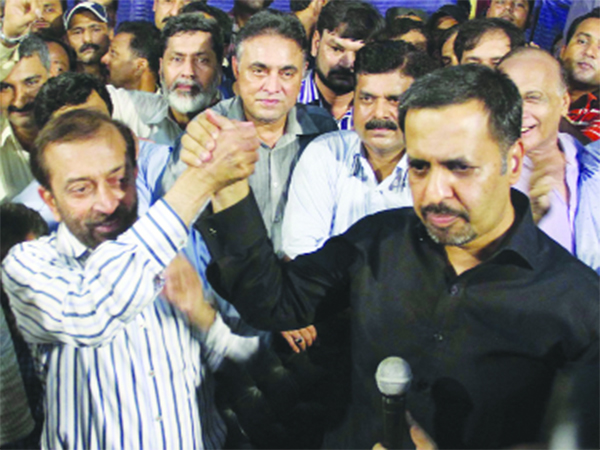
Karachi’s politics has revolved around Altaf Hussain for over three decades, and is likely to continue to in the years to come. Attempts by several military and political governments have failed so far to contain his influence over the city. In the latest faux pas, the attempts of the miltablishment (as Najam Sethi likes to call it) to bring Mustafa Kamal’s Paksarzameen Party and Farooq Sattar’s MQM-Pakistan have bombed. Ironically enough, matters were made worse not by Farooq Sattar, but the miltablishment’s blue-eyed boy in Karachi Mustafa Kamal, who openly talked about the deep-state’s intervening role in Karachi’s politics.
The fact of the matter is that there is little that the miltablishment can do in the long-term to curtail Altaf’s influence in the city. Voters all around the world, and especially the South, tend to stick to their political affiliations over generations. The bond between voters and their parties of choice strengthens when they feel that their party is going tough times, and they are often forgiving and forgetting of past shortcomings.
Something similar is happening in urban Sindh these days. The more pressure miltablishment exerts on Altaf Hussain, the more his voter base solidifies. Although the deep-state has successfully alienated almost the entire second tier of the party leadership from Altaf, this will not impact Altaf’s vote bank. On the contrary, the deserters would be seen as weaklings, or worse, traitors who left the party in its moment of need.
In the short-run, however, the miltablishment has a certain upper hand in dealing with Altaf. They have blocked airing of his speeches on television, decimated his party’s organizational structure, and imprisoned countless followers. More importantly, his party was registered under Farooq Sattar’s name with the Election Commission, depriving Altaf of a platform to contest the 2018 general elections. So, here’s the dilemma: Altaf has the votes but not the party, Farooq Sattar has the party but not the votes—and Mustafa Kamal has none.
It is indeed curious how Altaf Hussain will strategize against these odds. He has been in the game for decades and has seen many ups and downs. In theory, at least, he should have some sort of plan to deal with the emerging hostile situation. Curious to see what those plans might be, I decided to watch some of his recent ‘lectures’ which are available on YouTube. These lectures go on for hours and are mostly filled with pointless topics, ramblings about nothing, and banal wisdom. He comes across as your chatty retired uncle who thinks he is an authority on everything from philosophy and religion to science.
My time was not entirely wasted watching these videos as I found moments in which Altaf gave some insights to what he might be up to these days. The first thing worth noting is that he has been giving these lectures sober and looks visibly healthy compared to how he did a few months back. He frankly admitted to his followers that he is receiving rehabilitation services, but needs more time to fully recover, given the extent of problems he has had. This was indeed very brave of him.
We are all aware of Altaf’s hostile stance on the military over the last few years. He seems to have solidified in his opinions, and spoke at length against military generals. What was interesting though was that he was equally dismissive of the judiciary this time, holding it responsible for most of Pakistan’s current problems. His stance on Nawaz SharIf was also a marked departure from his previous outburst against the PML-N chief. Altaf seems to have developed a soft corner for the PML-N and probably considers it his natural ally in his battle against the miltablishment.

It would be interesting to see if these parties move ahead together in the coming months. Could the PML-N provide Altaf the cover he needs? If history can tell us anything, it is that Altaf’s voters tend to be loyal and would readily vote for his candidates. Since Altaf does not have his own party, in theory he can persuade his followers to vote for the PML-N’s candidates which were selected by him. If these two reach an understanding before the elections, this would be a win-win for both. Altaf will get to show everyone that he enjoys the public mandate, and THE PML-N will get extra seats in the house.
Another option for Altaf is to have a new political party registered with the Election Commission. This might be risky as the miltablishment can block the new party. Keeping a major party secret would indeed be difficult. The other option is to have independent candidates contest elections from various constituencies, with Altaf announcing his support for them near election day. One problem with this is that all independents will have different symbols and it would be difficult to prepare citizens to cast their votes for Altaf’s candidate in such a brief time. Also, the miltablishment can stop people from canvassing on behalf of independents.
The fourth option for Altaf would be to boycott the elections and hope for an unusually low turnout, strengthening his claims of legitimacy over the city’s politics. This path would, however, be counterproductive and will give Farooq Sattar’s MQM-Pakistan a walk-over. The by-elections results for PS-114 have shown that MQM supporters will vote for MQM-Pakistan if Altaf is not in the race.
Regardless of whether Altaf will be able to win this contest or not, it is certain that he is not planning to go anywhere anytime soon. He will continue to influence the city’s politics.
The writer is Assistant Professor of Public Policy and Administration at Cleveland State University. He can be reached at obedpasha@gmail.com. His twitter handle is @RamblingSufi
The fact of the matter is that there is little that the miltablishment can do in the long-term to curtail Altaf’s influence in the city. Voters all around the world, and especially the South, tend to stick to their political affiliations over generations. The bond between voters and their parties of choice strengthens when they feel that their party is going tough times, and they are often forgiving and forgetting of past shortcomings.
So, here's the dilemma: Altaf has the votes but not the party, Farooq Sattar has the party but not the votes-and Mustafa Kamal has none
Something similar is happening in urban Sindh these days. The more pressure miltablishment exerts on Altaf Hussain, the more his voter base solidifies. Although the deep-state has successfully alienated almost the entire second tier of the party leadership from Altaf, this will not impact Altaf’s vote bank. On the contrary, the deserters would be seen as weaklings, or worse, traitors who left the party in its moment of need.
In the short-run, however, the miltablishment has a certain upper hand in dealing with Altaf. They have blocked airing of his speeches on television, decimated his party’s organizational structure, and imprisoned countless followers. More importantly, his party was registered under Farooq Sattar’s name with the Election Commission, depriving Altaf of a platform to contest the 2018 general elections. So, here’s the dilemma: Altaf has the votes but not the party, Farooq Sattar has the party but not the votes—and Mustafa Kamal has none.
It is indeed curious how Altaf Hussain will strategize against these odds. He has been in the game for decades and has seen many ups and downs. In theory, at least, he should have some sort of plan to deal with the emerging hostile situation. Curious to see what those plans might be, I decided to watch some of his recent ‘lectures’ which are available on YouTube. These lectures go on for hours and are mostly filled with pointless topics, ramblings about nothing, and banal wisdom. He comes across as your chatty retired uncle who thinks he is an authority on everything from philosophy and religion to science.
The first thing worth noting is that he has been giving these lectures sober and looks visibly healthy compared to how he did a few months back
My time was not entirely wasted watching these videos as I found moments in which Altaf gave some insights to what he might be up to these days. The first thing worth noting is that he has been giving these lectures sober and looks visibly healthy compared to how he did a few months back. He frankly admitted to his followers that he is receiving rehabilitation services, but needs more time to fully recover, given the extent of problems he has had. This was indeed very brave of him.
We are all aware of Altaf’s hostile stance on the military over the last few years. He seems to have solidified in his opinions, and spoke at length against military generals. What was interesting though was that he was equally dismissive of the judiciary this time, holding it responsible for most of Pakistan’s current problems. His stance on Nawaz SharIf was also a marked departure from his previous outburst against the PML-N chief. Altaf seems to have developed a soft corner for the PML-N and probably considers it his natural ally in his battle against the miltablishment.

It would be interesting to see if these parties move ahead together in the coming months. Could the PML-N provide Altaf the cover he needs? If history can tell us anything, it is that Altaf’s voters tend to be loyal and would readily vote for his candidates. Since Altaf does not have his own party, in theory he can persuade his followers to vote for the PML-N’s candidates which were selected by him. If these two reach an understanding before the elections, this would be a win-win for both. Altaf will get to show everyone that he enjoys the public mandate, and THE PML-N will get extra seats in the house.
Another option for Altaf is to have a new political party registered with the Election Commission. This might be risky as the miltablishment can block the new party. Keeping a major party secret would indeed be difficult. The other option is to have independent candidates contest elections from various constituencies, with Altaf announcing his support for them near election day. One problem with this is that all independents will have different symbols and it would be difficult to prepare citizens to cast their votes for Altaf’s candidate in such a brief time. Also, the miltablishment can stop people from canvassing on behalf of independents.
The fourth option for Altaf would be to boycott the elections and hope for an unusually low turnout, strengthening his claims of legitimacy over the city’s politics. This path would, however, be counterproductive and will give Farooq Sattar’s MQM-Pakistan a walk-over. The by-elections results for PS-114 have shown that MQM supporters will vote for MQM-Pakistan if Altaf is not in the race.
Regardless of whether Altaf will be able to win this contest or not, it is certain that he is not planning to go anywhere anytime soon. He will continue to influence the city’s politics.
The writer is Assistant Professor of Public Policy and Administration at Cleveland State University. He can be reached at obedpasha@gmail.com. His twitter handle is @RamblingSufi

